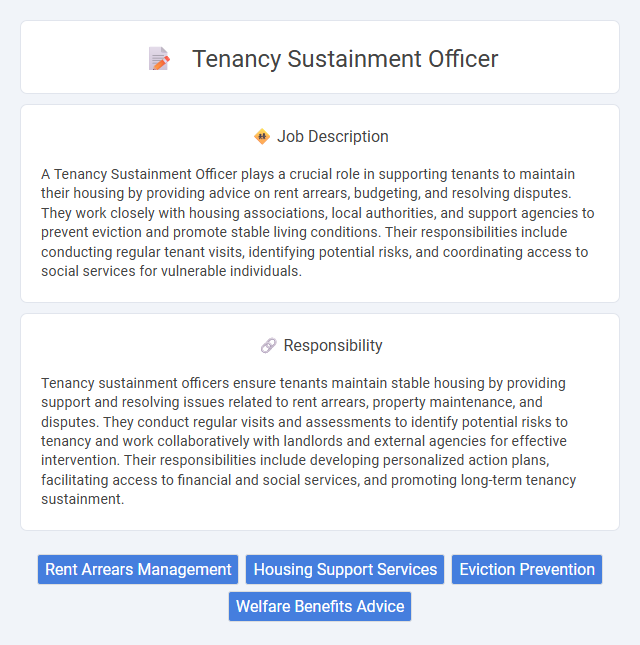
A Tenancy Sustainment Officer plays a crucial role in supporting tenants to maintain their housing by providing advice on rent arrears, budgeting, and resolving disputes. They work closely with housing associations, local authorities, and support agencies to prevent eviction and promote stable living conditions. Their responsibilities include conducting regular tenant visits, identifying potential risks, and coordinating access to social services for vulnerable individuals.
Individuals who demonstrate strong empathy and conflict resolution skills are likely to be suitable for a Tenancy Sustainment Officer role, as the job involves supporting tenants facing housing challenges. Those who can manage stressful situations calmly and communicate effectively with diverse populations may find this position aligns well with their abilities. Conversely, candidates who struggle with interpersonal communication or handling complex social issues might face difficulties in sustaining tenant relationships.
Qualification
A Tenancy Sustainment Officer typically requires a background in social work, housing management, or a related field, often holding a qualification such as a diploma or degree in housing studies or community development. Strong knowledge of tenancy laws, conflict resolution skills, and experience with vulnerable tenants are essential qualifications. Proficiency in case management and excellent communication skills are crucial for effectively supporting tenants to maintain their tenancies.
Responsibility
Tenancy sustainment officers ensure tenants maintain stable housing by providing support and resolving issues related to rent arrears, property maintenance, and disputes. They conduct regular visits and assessments to identify potential risks to tenancy and work collaboratively with landlords and external agencies for effective intervention. Their responsibilities include developing personalized action plans, facilitating access to financial and social services, and promoting long-term tenancy sustainment.
Benefit
Tenancy sustainment officers likely improve tenant stability by providing tailored support that minimizes eviction risks and promotes long-term housing security. Their interventions probably enhance tenants' ability to manage rent payments and resolve disputes, leading to more consistent tenancy durations. As a result, landlords may experience reduced turnover rates and greater property management efficiency.
Challenge
A Tenancy Sustainment Officer may face challenges in managing tenants with complex social and financial issues, which could hinder timely rent payments and property upkeep. The role likely requires constant negotiation and conflict resolution skills to maintain positive tenant relationships while ensuring lease compliance. Balancing limited resources and increasing caseloads might also pose significant difficulties in delivering consistent support.
Career Advancement
Tenancy Sustainment Officers play a crucial role in supporting tenants to maintain their housing, offering guidance on rent payments and resolving tenancy issues to prevent eviction. Career advancement opportunities typically include progressing to senior tenancy management roles or specialized positions in housing support and social services. Gaining experience in conflict resolution, housing law, and community engagement significantly enhances prospects for leadership roles within housing associations or local government agencies.
Key Terms
Rent Arrears Management
Tenancy Sustainment Officers specializing in Rent Arrears Management play a crucial role in supporting tenants to maintain their housing by proactively addressing rent arrears issues through tailored intervention strategies. They collaborate with housing associations, social services, and financial advisors to create sustainable repayment plans, preventing eviction and promoting long-term tenancy stability. Their expertise includes monitoring rent accounts, advising on budgeting skills, and facilitating access to welfare benefits, thereby reducing financial exclusion and homelessness risks.
Housing Support Services
A Tenancy Sustainment Officer plays a crucial role in Housing Support Services by assisting tenants in maintaining stable and secure housing through personalized support and intervention strategies. Their responsibilities include preventing eviction by addressing issues such as rent arrears, managing tenant relationships, and coordinating with local agencies to provide comprehensive welfare assistance. Effective tenancy sustainment reduces homelessness rates and fosters community wellbeing by ensuring long-term tenancy success.
Eviction Prevention
Tenancy Sustainment Officers play a crucial role in eviction prevention by providing tailored support and intervention to at-risk tenants, ensuring they understand their rights and responsibilities. They conduct regular assessments to identify potential tenancy issues early, helping to resolve payment difficulties and tenancy disputes through mediation and access to support services. By coordinating with landlords, social services, and legal advisors, Tenancy Sustainment Officers aim to maintain stable housing and reduce homelessness.
Welfare Benefits Advice
Tenancy sustainment officers specializing in welfare benefits advice provide crucial support to tenants by guiding them through the complexities of benefit claims, ensuring they access entitled financial assistance to maintain stable housing. They conduct detailed assessments of tenants' eligibility for various welfare programs, assist in completing application forms, and advocate on behalf of tenants with government agencies to prevent rent arrears and eviction. Their expertise in welfare policies and proactive intervention significantly contributes to tenancy retention and overall housing stability.
 kuljobs.com
kuljobs.com